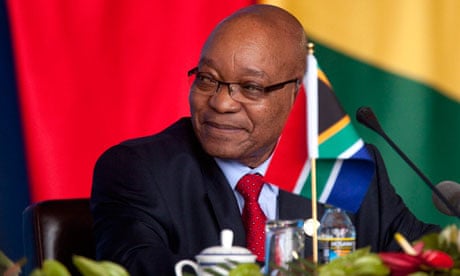Jacob Zuma had to wait four months before really enjoying his Christmas gift. Last Thursday, on China's Hainan island, the South African president joined his counterparts from Brazil, Russia, India and China for the third summit meeting of the informal group named after the initials of its members. Formerly Bric, it is now the Brics club.
The invitation to join the group was issued on 24 December. Zuma had worked hard, visiting each of the Bric members in 2010, and he was rewarded with a diplomatic victory. He lost no time endorsing his new partners' concerns about the massive influx of foreign assets currently plaguing emerging countries, where yields are higher than in developed nations.
Initially the decision to bring South Africa into the club prompted surprise, even incomprehension. How could this economic dwarf be a member, with Mexico, South Korea and Turkey still left out in the cold? South Africa's gross domestic product only amounts to one-sixteenth of China's output, it only has 50 million inhabitants and annual growth barely exceeds 3.5%, far behind China (10.3% last year). Thanks to their booming economies, the four other Brics members will contribute 60% of global growth in 2014, according to the IMF.
"For South Africa to be treated as part of Bric doesn't make any sense to me," commented Jim O'Neill last December. The chairman of Goldman Sachs Asset Management International, who originally coined the acronym, added, "But South Africa as a representative of the African continent is a different story."
In choosing to broaden their constituency the Brics countries have made a significant move. This is no longer an artificial body founded on comparable economic performance, but increasingly a political club representing the developing world, determined to counterbalance western influence in major international forums.
At their meeting in Sanya the five leaders discussed reform of the world's financial bodies. Zuma echoed demands by India and Brazil for a permanent seat on the UN security council.
Of course South African membership of this select club is connected to the race to grab the mineral resources emerging nations so badly need. Not only is it the world's fourth largest source of gold and diamonds, it is also sitting on more than three-quarters of global platinum reserves. China became its top trading partner in 2009.
Zuma has also presented South Africa as the gateway to the African continent and its 1 billion potential consumers. "South Africa provides the institutional stability, depth of financial markets, and regulatory efficiency that many corporates will look to capitalise on as a base for wider pan-African operations," notes a study by the Standard Bank (one of the country's four largest banks). There are nevertheless limits to how far this argument can be taken, given the continent's political complexity.
"The future for South Africa is with the African market and it is a risky ploy to help competitors to enter it," warns Lyal White, head of the Centre for Dynamic Markets at Pretoria University. "Instead South African firms need to attract investors from Bric countries and then develop in other parts of the continent."
Zuma, who has promised to create 5m jobs by 2020, took 70 business executives with him to the Sanya summit. "Shoprite, a big retail firm, has huge potential for growth in India, but the government has so far refused to let it in. Now there is a great opportunity to negotiate," says Simon Freemantle, a research analyst at Standard Bank. "Our banking and financial sectors are pretty sophisticated and have a strong hand to play in these countries," adds Dawie Roodt, chief economist of Efficient Group.
Originally published in Le Monde
